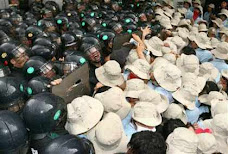
Human Rights Watch Press Release:
CHINA: INVESTIGATE CRACKDOWN BEFORE TORCH RELAY’S PASSAGE THROUGH TIBET
Account for Missing and Dead; Reopen Lhasa to Media and Monitors(New York, March 24, 2008) – The Olympic torch, which was lit today in Olympia, Greece, should not go through Tibet unless the Chinese government agrees to an independent investigation into the recent unrest in Tibetan areas, Human Rights Watch said today.The Olympic torch is set to pass through the Tibetan capital, Lhasa, on June 20-21. Chinese government officials have confirmed their plans to continue despite the ongoing protests and crackdown across ethnic Tibetan areas. Since March 10, unprecedented demonstrations have taken place in the Tibetan Autonomous Region, at least three Chinese provinces, and Beijing. Chinese security forces have responded by dispersing the protests, in some cases violently. The Chinese government claims that 18 civilians and one policeman were killed, and a total of 623 people injured during the protests in Lhasa on March 12. Tibetan exile groups have reported that at least 80 people died during the protests.
The Chinese government has now admitted opening fire on demonstrators in Sichuan and shooting four people. Foreign journalists were expelled from these areas shortly after the demonstrations began, and lines of communication of have been cut or heavily restricted. “Either Tibet is open or it’s not. If it is, let independent monitors and the media go there. If it’s not, the torch shouldn’t go there either,” said Sophie Richardson, Asia advocacy director for Human Rights Watch. “The Olympic torch should not be turned into a smokescreen to cover up human rights abuses.” With a large but unknown number of Tibetans detained in Tibet and adjoining provinces in the aftermath of public protests, Human Rights Watch said Beijing Olympic officials’ resolve to run the Olympic torch through the region could exacerbate tensions, invite new protests, and provoke further repression. Human Rights Watch has called for the Chinese government to: - lift its lock-down of all Tibetan areas, including allowing full media access; - account for the missing and dead from this month’s protests; - publish the names of all individuals detained and their places of detention; and - give immediate access to independent monitors who can investigate whether detainees are being tortured or mistreated. Human Rights Watch said governments, the International Olympic Committee and Olympic sponsors of the torch relay should press China to reopen the region and allow an independent investigation, ideally headed by the Office of the United Nations High Commissioner for Human Rights, into recent events in Tibet. “The IOC and the sponsors of the torch relay – Coca-Cola, Samsung and Lenovo – should not associate themselves with a highly repressive situation where abuses are very likely, in violation both of the Olympic Charter and of the basic principles of corporate social responsibility,” said Richardson. “Acting responsibly is good publicity. Being morally blind is not.”
More on China and Tibet:http://www.hrw.org/doc?t=asia&c=china-----------
Please help support the research that made this bulletin possible. In orderto protect our objectivity, Human Rights Watch does not accept funding fromany government. We depend entirely on the generosity of people like you.To make a contribution, please visit http://hrw.kintera.org/donate3

Beijing's unofficial Olympic slogan
By Howard W. French
International Herald Tribune
Thursday, March 13, 2008
SHANGHAI: The official slogan of this summer's Beijing Olympics may be "One World, One Dream," but Beijing's real mantra has been something more prosaic, and in the end, much more problematic: no politics.
Over the coming months, China will offer the world an astounding spectacle. Not the Games themselves, but rather the spectacle of a nation that is in the midst of breathtaking change and yet clings to habits of statecraft so dated that they seem like relics of the Middle Ages.
In elevating the Olympics to an official source of national pride, China has put its most precious commodities on the line: national face. And by investing so much face in the successful execution of the Games, it is making extreme demands on its citizens and on the world.
The following list is not exhaustive, but it gives an idea of what is being demanded: Smile, approve of us, behave, do not criticize, don't dare protest and, back to the mantra, banish all thoughts of politics from your minds.
That's asking an awful lot, and like requiring someone to hold their body rigid for an extended period, it will demand an immense and painful effort, and it brings the risk of self-injury.
Consider the government's cascade of systematic denials of the pertinence of just about every critical issue that comes up, including human rights in Tibet, China's Muslim northwest and the rights of the tens of thousands of migrant workers whose round-the-clock work in Beijing has made the hosting of the Games possible. All too often, they are phrased in the antique wooden tongue of an old imperial court.
On the migrant issue, the Chinese Foreign Ministry spokesman, Qin Gang, responded to a report by Human Rights Watch detailing exploitation of the workers with a verbal equivalent of the stiff arm: "I believe that everybody is well aware that Human Rights Watch has some problem with its sight. It is biased. It has some problems with its eyes. It has weakness in seeing things properly."
Read More here































No hay comentarios:
Publicar un comentario